Strictly Personal
10,000 rules that have tried ‑ and failed – to kill trade in the East African Community, By Charles Onyango-Obbo
Published
1 year agoon

During the week, the business press in Nairobi, quoting a government paper, reported that Kenya and Tanzania had resolved 23 problematic regulations that slowed down trade between the two countries since President Samia Suluhu Hassan visited Kenya in May 2021.
The non-tariff barriers (NTBs) ranged from rules on licences to quotas, embargoes, foreign exchange restrictions and import deposits. The reports made the point that a lot of progress had been made.
It can be difficult to imagine that there were still as many as 23 rules hindering trade between two East Afriacan Community economies, but that is if you haven’t heard the full story.
The resolution of those 23 squabbles brought the number of cumulative NTBs that were sorted and eliminated to 256 by end of June 2022.
Those 256, however, are not even the tip of the iceberg. An expert who studies the bewildering rules East African bureaucrats have imposed on what — on paper — is supposed to an open the Common Market told me there are nearly 1,000 of them governing just food trade in the EAC!
At that rate, if one adds up the regulations that get in the way of trade in the region, which include countless national legislations in the seven EAC partner states, not just the stuff in the EAC protocols, there could well be 10,000 of them.
During the week, the business press in Nairobi, quoting a government paper, reported that Kenya and Tanzania had resolved 23 problematic regulations that slowed down trade between the two countries since President Samia Suluhu Hassan visited Kenya in May 2021.
The non-tariff barriers (NTBs) ranged from rules on licences to quotas, embargoes, foreign exchange restrictions and import deposits. The reports made the point that a lot of progress had been made.
It can be difficult to imagine that there were still as many as 23 rules hindering trade between two East Afriacan Community economies, but that is if you haven’t heard the full story.
The resolution of those 23 squabbles brought the number of cumulative NTBs that were sorted and eliminated to 256 by end of June 2022.
Those 256, however, are not even the tip of the iceberg. An expert who studies the bewildering rules East African bureaucrats have imposed on what — on paper — is supposed to an open the Common Market told me there are nearly 1,000 of them governing just food trade in the EAC!
At that rate, if one adds up the regulations that get in the way of trade in the region, which include countless national legislations in the seven EAC partner states, not just the stuff in the EAC protocols, there could well be 10,000 of them.
That is 10,000 reasons why there isn’t free flow of trade in the EAC. To see the impact they are having, consider what happened when Kenya and Tanzania dealt with just those two dozen NTBs.
The reports noted that trade between Kenya and Tanzania crossed the Ksh100 billion (nearly $808 million) mark for the first time. Multiply that across the EAC and you are looking at billions of dollars left on the table because of NTBs.
If East Africa truly swung its markets open, there would be a lot of money swishing around, jobs galore for youth, and booming economies generating a lot of taxes for the politicians to feed on. It is a mystery that this national economic interest is still trumped by nationalism and small-minded protectionism.
With thousands of these trade-hampering regulations, for most business to be done, customs and other officials at the border have to behave like traffic police in most of East Africa. Most people don’t realise it, but the traffic rules in the region, going back to the colonial period, are a mountain. New rules have only piled on old ones.
There are thousands of rules, down to the colour of cars, ride height, tyre type, extinguishers, wattage of lights, tools that should be in a car, drivers’ vision, and so forth which, if enforced 100 percent, there would be no cars on East Africa’s roads.
Today, you will roll up to an EAC border point, and cross into the next country while eating roast maize or a fresh mango and no one will flag you down. If you read the rules in detail, that is not permissible. Happily, the rules are sometimes overcome by bewildering borders too.
Arua is a hectic city in northwest Uganda, situated strategically between the country’s borders with the Democratic Republic of Congo and South Sudan.
A few kilometres out of Arua, the official Uganda-DRC customs post is Vurra. It’s not as famous as Namanga, Busia, Malaba, Katuna/Gatuna, or Nimule, and no fancy one-stop border post has been built there yet.
However, it’s a fascinating little devil of a border. When you get past the boom gate on the Uganda side, you head into DRC. But that is only if you turn right. Despite having crossed the gate, if you turned left you would remain in Uganda. If you stay left, you are essentially governed by a different logic about the border, than if you if go right.
There is nothing stopping the Ugandan chap who turned left from turning right into DRC a kilometre in, or to hand a packet of maize flour to his Congolese mistress. Yet, somehow, an invisible order keeps most people in their right territorial lane.
Not always, though.
In 2021, Uganda closed the Vurra customs post for two months after Congolese youth crossed and erected a barrier and other structures 300 metres inside Uganda, claiming it was part of DRC territory. It didn’t make regional or international news. All attention was still on the Katuna (Gatuna in Rwanda) border that had been closed at that point for two years.
The matter was solved with little drama. When the border reopened, as we saw with Katuna/Gatuna last year, the people on both sides went into wild celebrations. The confusion of the Congolese youth about the border line, and the reluctance of the Ugandan authorities to use a hammer to resolve the “incursion,” was understandable.
Besides the big trucks carrying fuel and other goods to the DRC and South Sudan, the most common trade vehicles on the roads there are the lorries, young people perched on top, carrying Ugandan cattle to the borders. Some of them come from as far as western Uganda, ferrying cattle to South Sudan. It is a surprisingly orderly and big business. If the weird rules about livestock trade were enforced, perhaps not a single animal would cross the border.
And the local Congolese and South Sudan elite would miss out on their beef steak. Thank goodness for common sense, and some cross-border pragmatism.
It would be wonderful the day that spirit infected all of East African trade.
Charles Onyango-Obbo is a journalist, writer, and curator of the “Wall of Great Africans”. Twitter@cobbo3
You may like
-
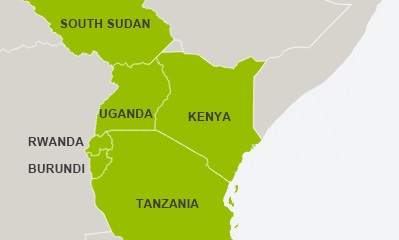

Our leaders need to develop an EAC character that abhors NTBs, By Joachim Buwembo
-
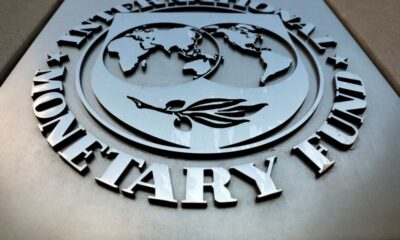

IMF eases East Africa’s indebted states’ burden with $1.9b deals
-
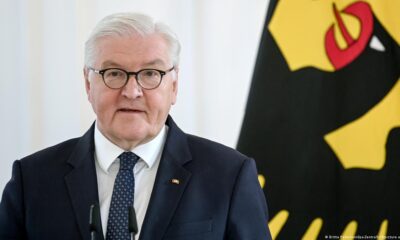

As Germany’s Chancellor rounds off African tour, its President begins own tour in Tanzania
-
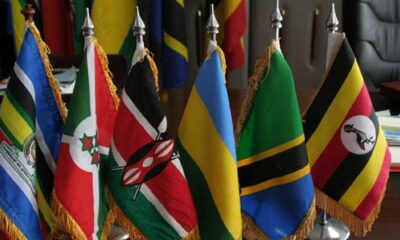

Kenya is to EA what the US is to the world; you just can’t write it off, By Joachim Buwembo
-


Congo DR: Kenya appoints new regional force leader amid criticism over support for rebel group, M23
-
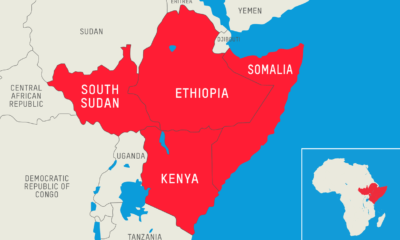

Political federation, when it occurs, will be through an East African military union, By Charles Onyango-Obbo
Strictly Personal
Air Peace, capitalism and national interest, By Dakuku Peterside
Published
3 days agoon
April 16, 2024
Nigerian corporate influence and that of the West continue to collide. The rationale is straightforward: whereas corporate activity in Europe and America is part of their larger local and foreign policy engagement, privately owned enterprises in Nigeria or commercial interests are not part of Nigeria’s foreign policy ecosystem, neither is there a strong culture of government support for privately owned enterprises’ expansion locally and internationally.
The relationship between Nigerian businesses and foreign policy is important to the national interest. When backing domestic Nigerian companies to compete on a worldwide scale, the government should see it as a lever to drive foreign policy, and national strategic interest, promote trade, enhance national security considerations, and minimize distortion in the domestic market as the foreign airlines were doing, boost GDP, create employment opportunities, and optimize corporate returns for the firms.
Admitted nations do not always interfere directly in their companies’ business and commercial dealings, and there are always exceptions. I can cite two areas of exception: military sales by companies because of their strategic implications and are, therefore, part of foreign and diplomatic policy and processes. The second is where the products or routes of a company have implications for foreign policy. Air Peace falls into the second category in the Lagos – London route.
Two events demonstrate an emerging trend that, if not checked, will disincentivize Nigerian firms from competing in the global marketplace. There are other notable examples, but I am using these two examples because they are very recent and ongoing, and they are typological representations of the need for Nigerian government backing and support for local companies that are playing in a very competitive international market dominated by big foreign companies whose governments are using all forms of foreign policies and diplomacy to support and sustain.
The first is Air Peace. It is the only Nigerian-owned aviation company playing globally and checkmating the dominance of foreign airlines. The most recent advance is the commencement of flights on the Lagos – London route. In Nigeria, foreign airlines are well-established and accustomed to a lack of rivalry, yet a free-market economy depends on the existence of competition. Nigeria has significantly larger airline profits per passenger than other comparable African nations. Insufficient competition has resulted in high ticket costs and poor service quality. It is precisely this jinx that Air Peace is attempting to break.
On March 30, 2024, Air Peace reciprocated the lopsided Bilateral Air Service Agreement, BASA, between Nigeria and the United Kingdom when the local airline began direct flight operations from Lagos to Gatwick Airport in London. This elicited several reactions from foreign airlines backed by their various sovereigns because of their strategic interest. A critical response is the commencement of a price war. Before the Air Peace entry, the price of international flight tickets on the Lagos-London route had soared to as much as N3.5 million for the economy ticket. However, after Air Peace introduced a return economy class ticket priced at N1.2 million, foreign carriers like British Airways, Virgin Atlantic, and Qatar Airways reduced their fares significantly to remain competitive.
In a price war, there is little the government can do. In an open-market competitive situation such as this, our government must not act in a manner that suggests it is antagonistic to foreign players and competitors. There must be an appearance of a level playing field. However, government owes Air Peace protection against foreign competitors backed by their home governments. This is in the overall interest of the Nigerian consumer of goods and services. Competition history in the airspace works where the Consumer Protection Authority in the host country is active. This is almost absent in Nigeria and it is a reason why foreign airlines have been arbitrary in pricing their tickets. Nigerian consumers are often at the mercy of these foreign firms who lack any vista of patriotism and are more inclined to protect the national interest of their governments and countries.
It would not be too much to expect Nigerian companies playing globally to benefit from the protection of the Nigerian government to limit influence peddling by foreign-owned companies. The success of Air Peace should enable a more competitive and sustainable market, allowing domestic players to grow their network and propel Nigeria to the forefront of international aviation.
The second is Proforce, a Nigerian-owned military hardware manufacturing firm active in Rwanda, Chad, Mali, Ghana, Niger, Burkina Faso, and South Sudan. Despite the growing capacity of Proforce in military hardware manufacturing, Nigeria entered two lopsided arrangements with two UAE firms to supply military equipment worth billions of dollars , respectively. Both deals are backed by the UAE government but executed by UAE firms.
These deals on a more extensive web are not unconnected with UAE’s national strategic interest. In pursuit of its strategic national interest, India is pushing Indian firms to supply military equipment to Nigeria. The Nigerian defence equipment market has seen weaker indigenous competitors driven out due to the combination of local manufacturers’ lack of competitive capacity and government patronage of Asian, European, and US firms in the defence equipment manufacturing sector. This is a misnomer and needs to be corrected.
Not only should our government be the primary customer of this firm if its products meet international standards, but it should also support and protect it from the harsh competitive realities of a challenging but strategic market directly linked to our national military procurement ecosystem. The ability to produce military hardware locally is significant to our defence strategy.
This firm and similar companies playing in this strategic defence area must be considered strategic and have a considerable place in Nigeria’s foreign policy calculations. Protecting Nigeria’s interests is the primary reason for our engagement in global diplomacy. The government must deliberately balance national interest with capacity and competence in military hardware purchases. It will not be too much to ask these foreign firms to partner with local companies so we can embed the technology transfer advantages.
Our government must create an environment that enables our local companies to compete globally and ply their trades in various countries. It should be part of the government’s overall economic, strategic growth agenda to identify areas or sectors in which Nigerian companies have a competitive advantage, especially in the sub-region and across Africa and support the companies in these sectors to advance and grow to dominate in the African region with a view to competing globally. Government support in the form of incentives such as competitive grants ,tax credit for consumers ,low-interest capital, patronage, G2G business, operational support, and diplomatic lobbying, amongst others, will alter the competitive landscape. Governments and key government agencies in the west retain the services of lobbying firms in pursuit of its strategic interest.
Nigerian firms’ competitiveness on a global scale can only be enhanced by the support of the Nigerian government. Foreign policy interests should be a key driver of Nigerian trade agreements. How does the Nigerian government support private companies to grow and compete globally? Is it intentionally mapping out growth areas and creating opportunities for Nigerian firms to maximize their potential? Is the government at the domestic level removing bottlenecks and impediments to private company growth, allowing a level playing field for these companies to compete with international companies?
Why is the government patronising foreign firms against local firms if their products are of similar value? Why are Nigerian consumers left to the hands of international companies in some sectors without the government actively supporting the growth of local firms to compete in those sectors? These questions merit honest answers. Nigerian national interest must be the driving factor for our foreign policies, which must cover the private sector, just as is the case with most developed countries. The new global capitalism is not a product of accident or chance; the government has choreographed and shaped it by using foreign policies to support and protect local firms competing globally. Nigeria must learn to do the same to build a strong economy with more jobs.
Strictly Personal
This is chaos, not governance, and we must stop it, By Tee Ngugi
Published
1 week agoon
April 10, 2024
The following are stories that have dominated mainstream media in recent times. Fake fertiliser and attempts by powerful politicians to kill the story. A nation of bribes, government ministries and corporations where the vice is so routine that it has the semblance of policy. Irregular spending of billions in Nairobi County.
Billions are spent in all countries on domestic and foreign travel. Grabbing of land belonging to state corporations, was a scam reminiscent of the Kanu era when even public toilets would be grabbed. Crisis in the health and education sectors.
Tribalism in hiring for state jobs. Return of construction in riparian lands and natural waterways. Relocation of major businesses because of high cost of power and heavy taxation. A tax regime that is so punitive, it squeezes life out of small businesses. Etc, ad nauseam.
To be fair, these stories of thievery, mismanagement, negligence, incompetence and greed have been present in all administrations since independence.
However, instead of the cynically-named “mama mboga” government reversing this gradual slide towards state failure, it is fuelling it.
Alternately, it’s campaigning for 2027 or gallivanting all over the world, evoking the legend of Emperor Nero playing the violin as Rome burned.
A government is run based on strict adherence to policies and laws. It appoints the most competent personnel, irrespective of tribe, to run efficient departments which have clear-cut goals.
It aligns education to its national vision. Its strategies to achieve food security should be driven by the best brains and guided by innovative policies. It enacts policies that attract investment and incentivize building of businesses. It treats any kind of thievery or negligence as sabotage.
Government is not a political party. Government officials should have nothing to do with political party matters. They should be so engaged in their government duties that they literally would not have time for party issues. Government jobs should not be used to reward girlfriends and cronies.
Government is exhausting work undertaken because of a passion to transform lives, not for the trappings of power. Government is not endless campaigning to win the next election. To his credit, Mwai Kibaki left party matters alone until he had to run for re-election.
We have corrupted the meaning of government. We have parliamentarians beholden to their tribes, not to ideas.
We have incompetent and corrupt judges. We have a civil service where you bribe to be served. Police take bribes to allow death traps on our roads. We have urban planners who plan nothing except how to line their pockets. We have regulatory agencies that regulate nothing, including the intake of their fat stomachs.
We have advisers who advise on which tenders should go to whom. There is no central organising ethos at the heart of government. There is no sense of national purpose. We have flurries of national activities, policies, legislation, appointments which don’t lead to meaningful growth. We just run on the same spot.
Tee Ngugi is a Nairobi-based political commentator
EDITOR’S PICK


‘Reconsider your anti-people policies, they are causing hardship, insecurity in Nigeria’— PDP tells Tinubu
Nigeria’s main opposition party, the Peoples Democratic Party (PDP), has called on President Bola Tinubu to consider what it calls...


Top European, Asian clubs on alert as Super Eagles keeper set to make contract decision
Some top clubs in Europe and Asia have been put on alert as Super Eagles and Chippa United goalkeeper, Stanley...


IMF says South Africa needs to do more to cut spending, lower debt-to-GDP ratio
A top official from the International Monetary Fund has revealed that South Africa needs to do more to cut spending...


Burkina Faso expels 3 French diplomats over ‘subversive activities’
According to a letter quoted by Reuters on Thursday, three French diplomats have been sent back to France by Burkina...


Nigeria’s MAX partners Ghana’s Kofa in e-bike financing deal
Nigeria’s electric vehicle solutions provider, MAX, has announced striking a partnership deal with Ghana’s innovator in energy networks, Kofa, that...


Zambia asks EU to help strengthen its democratic initiatives ahead of 2026 elections
The Zambian government has called on the European Union (EU) to help in strengthening democratic initiatives in the country as...


Nigeria destined to become major global economy under Tinubu— VP Shettima
Nigeria’s Vice President, Kashim Shettima, has predicted that the country is destined to become a major economic force in the...


Nigeria’s central bank insists depleting external reserves not due to Naira defence
According to the Central Bank of Nigeria (CBN), the big drop in the country’s foreign exchange reserves was not due...


African Guarantee Fund partners Nordic Development Fund to launch green finance in Nigeria
The African Guarantee Fund (AGF) has teamed up with the Nordic Development Fund (NDF) to launch a green finance fund...


Ethiopia’s Lemma, Kenya’s Obiri give Africa double podium finish at Boston Marathon
Ethiopia’s long distance runner, Sisay Lemma, and Kenyan female marathon sensation, Hellen Obiri, teamed up to give Africa a double...
Trending
-

 Sports2 days ago
Sports2 days agoEthiopia’s Lemma, Kenya’s Obiri give Africa double podium finish at Boston Marathon
-

 Culture2 days ago
Culture2 days agoDavido’s ‘Unavailable’ achieves milestone with 100 million views on YouTube, Spotify
-

 Metro2 days ago
Metro2 days agoZambia: Many feared injured as UPND, PF supporters clash in court
-
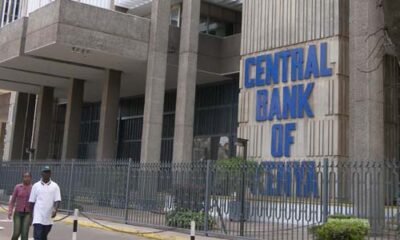
 VenturesNow2 days ago
VenturesNow2 days agoInvestors’ wealth drops by $968 million on Nairobi Securities Exchange


